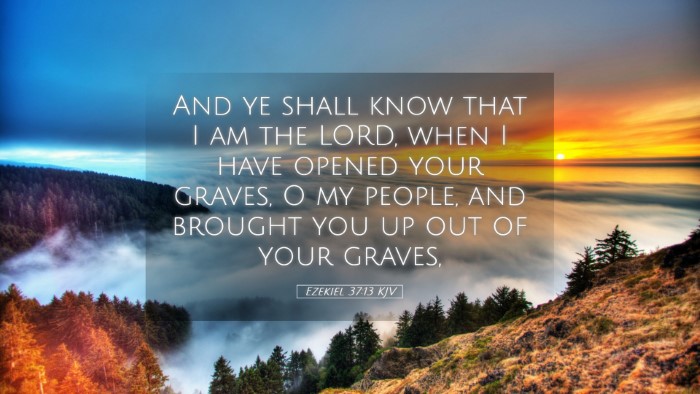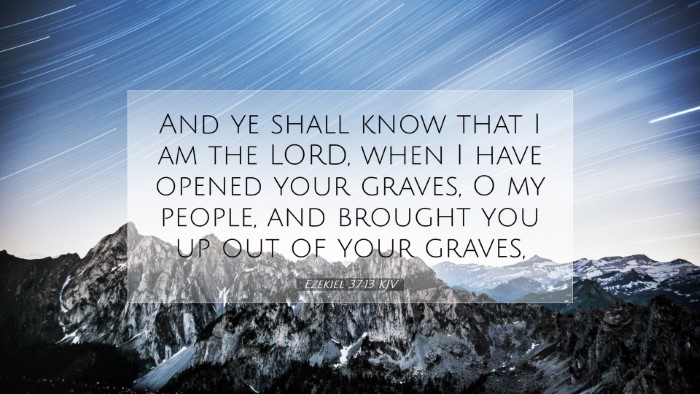Ezekiel 37:13 - Summary and Commentary
Verse Context: Ezekiel 37:13 (KJV) states, "And ye shall know that I am the Lord, when I have opened your graves, O my people, and brought you up out of your graves." This verse occurs within the context of the vision of the valley of dry bones, which symbolizes the restoration of Israel after exile.
Thematic Overview: This verse encapsulates the central theme of resurrection and divine restoration, reaffirming God’s sovereignty and faithfulness to His covenant people.
Interpretation and Meaning
The process of "opening the graves" involves not only physical resurrection but also the spiritual awakening of Israel. This is a profound declaration of hope for a nation considered lost and dispersed. Each part of the verse speaks to God's promise of revival and His commitment to His people.
Historical Context
The prophet Ezekiel was active during a critical period in Israel's history— the Babylonian exile. The exiled people of Israel craved assurance of their future and restoration. Ezekiel’s visions, particularly the dry bones imagery, serve to convey God’s power to revive not just individuals but a whole nation.
Commentary Insights
-
Matthew Henry:
Henry notes that this verse signifies the divine promise of revival. He emphasizes that just as God had the power to resurrect the dry bones, He has the authority to bring Israel back from spiritual death. This act serves not only as a physical restoration but also as a symbol of God’s continual presence with His people.
-
Albert Barnes:
Barnes elaborates on the metaphor of the graves, interpreting them as symbols of despair and hopelessness. The act of raising the Israelites from their graves parallels God’s redemptive work through Christ, who also conquered death. The expectation that the people will "know" the Lord points to a transformative experience of divine reality.
-
Adam Clarke:
Clarke focuses on the necessity of divine revelation in solidifying the people’s faith. He points out that knowing God is the culmination of the restoration process. The resurrection laid out by Ezekiel symbolizes God’s ultimate victory over sin, death, and despair. Clarke comments on how this verse can be applied in a broader spiritual context, where every believer experiences a spiritual resurrection through faith.
Theological Implications
This passage has far-reaching implications for understanding salvation history. The resurrection theme is interwoven throughout scripture, culminating in the New Testament with Christ's resurrection, which serves as the antitype of Ezekiel's vision.
Connection to New Testament
The resurrection promise provided in Ezekiel foreshadows New Testament teachings, particularly in Romans 6:4-5 where Paul explains believers are buried with Christ and will be resurrected with Him. This illustrates continuity in God’s plan across both Testaments, emphasizing His faithfulness and the hope of eternal life.
Practical Applications
- Hope in Despair: For pastors and leaders today, this verse serves as a profound reminder that God can transform situations considered hopeless. It encourages believers to place their faith in God's ability to resurrect dreams, ministries, and lives.
- Spiritual Awakening: The call to "know that I am the Lord" pushes individuals towards a deeper relationship with God, highlighting the importance of an experiential knowledge of God rather than a mere intellectual assent.
- Community Restoration: Just as God promised the restoration of Israel, church leaders are reminded of their role in fostering a community of healing and restoration, where those who feel lost can find hope and new life.
Conclusion
Ezekiel 37:13 stands as a powerful declaration of God's commitment to His people and His ability to transform the seemingly impossible into reality. For theologians, students, and pastors, this insight serves to deepen the understanding of God's redemptive work throughout history and into the present day. The message of resurrection, both physically and spiritually, is foundational to the Christian faith and continues to speak profoundly into the lives of believers today.


